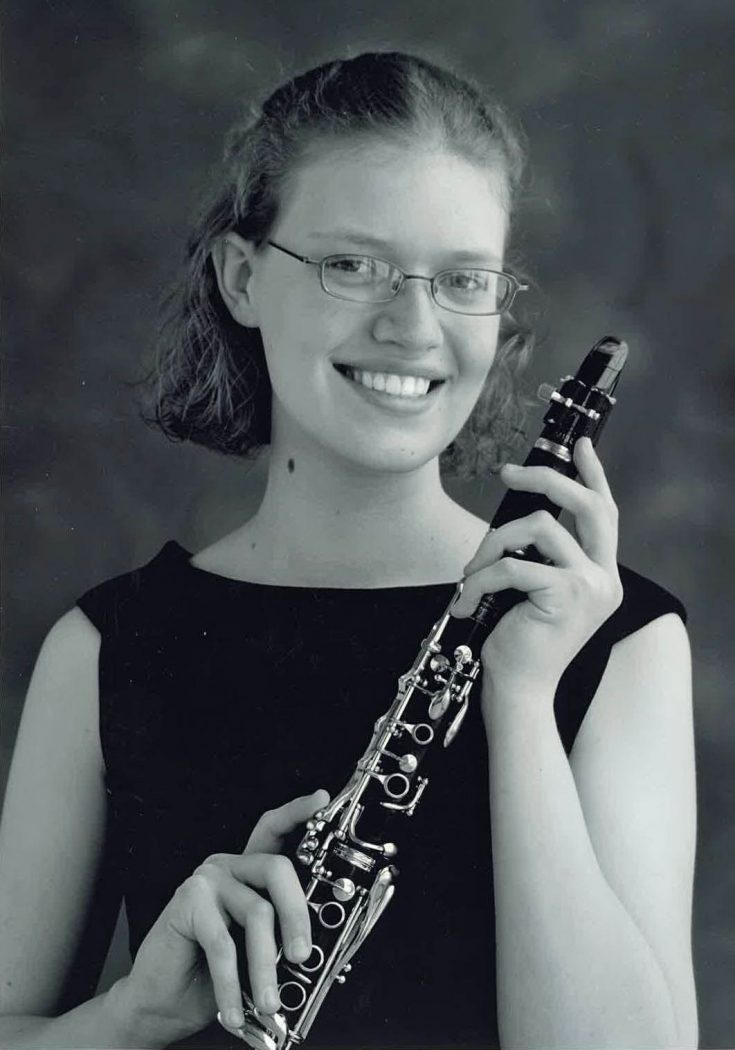Image caption: Nina Penner, Brock University Assistant Professor of Music, enjoys sharing her love of opera with her students.
Originally published in The Brock News | TUESDAY, NOVEMBER 09, 2021 | by Maryanne St. Denis
Note: Faculty Focus is a monthly series that highlights faculty whose compelling passions, innovative ideas and various areas of expertise help weave together the fabric of Brock University’s vibrant community. For more from the series, click here.
Nina Penner’s students are always surprised to learn she’s not a singer.
Although the opera expert has been a part of many productions throughout her career, her home has always been in the orchestral pit.
The classical clarinetist, and now Brock University Assistant Professor of Music, has always found herself fascinated with the art form and rejoices in her ability to share it with others.
Penner’s love for music began with the piano at age eight, but it wasn’t until a few years later when she picked up a clarinet that she truly found her fit.

Nina Penner, now an Assistant Professor of Music at Brock University,
spent countless hours during her childhood honing her skills on the clarinet.
For weeks, she played as much as her lips would allow, stopping only when her muscles weakened from exhaustion.
“I was obsessed with the clarinet,” she says lightheartedly, reminiscing about how her father went from renting her an instrument to quickly realizing a purchase was in their future.
Penner, who grew up in Niagara, began teaching herself from books before moving on to private lessons in her adolescence.
After high school graduation, she pursued her Bachelor of Music in Clarinet Performance at the University of Toronto.
“I like performing a lot, especially ensemble music, orchestra and chamber music,” she says. “I’ve always liked playing new music, including music by student composers.”
After time, however, Penner began to realize that the performer life — and the entrepreneurial aspects of promoting yourself and booking gigs — wasn’t for her.
Her interest was instead starting to drift in a new direction.
Penner’s history courses on music and music theory began to draw more of her attention and, after some discussions with her professors, she decided academia was the world she was best suited for.
She went on to complete her master’s at the University of Toronto and her PhD at McGill University, both in musicology.
But her love for opera never waned. She decided that as an academic, it would be her area of focus.
During her performance days, Penner’s gaze between notes often fell to the talented singers, her mind trying to take in as much detail as possible.
“I could see what was happening on stage and that was really fascinating,” she says. “I think that enhanced my desire to understand more about opera staging, which is what some of my early musicology work was about.”
Since joining Brock in July 2020, Penner has expanded her work to look at opera — as well as musical theatre and film music — as it relates to various social movements.

In high school, Nina Penner, now a Brock Assistant Professor of Music,
performed a concerto with the Niagara Youth Orchestra.
Her most recent project, funded by a Brock Social Sciences and Humanities Research Council Institution Grant, explores the experiences of Indigenous, Black and People of Colour working in opera in Canada.
The study, “Exploring New Collaborative Models in Indigenous-led Opera in Canada,” is a collaboration with Amplified Opera, a Toronto-based collective that seeks to amplify previously marginalized voices in the industry.
They are about to launch a survey to learn more about the frequency and severity of racial discrimination and microaggressions in Canadian opera.
“Because I’m not a singer and I’m a white settler, it was so important to get the voices of the people who this research is hopefully going to serve, to survey them about their experiences and about what can be done to rectify these situations,” she says. “This is not about getting people to relive these painful experiences, but to document them and start thinking about what we can do to move forward.”
After the survey is completed, Penner plans to interview about 20 singers this winter to get more detailed narratives and recommendations for change.
The intention is to ultimately improve equity and diversity in the opera industry.
“It’s not just about hiring more people of colour,” Penner says. “We also have to rethink how we’re creating the works themselves, rethink the actual creative process. How we are we working together and at what point are people of colour involved in creating these pieces?”
Companies led by People of Colour, such as Amplified Opera, are exploring new collaborative and leadership models, such as involving singers from the earliest stages of creating new works and productions. By documenting these new approaches, the study aims to encourage larger houses, such as the Canadian Opera Company, to consider replicating some of these collaborative models.
“The hope is to see not only indie opera companies but also the big houses take a risk and do something a bit differently,” she says.
For anyone new to the genre but interested in learning more about it, Penner says indie opera companies are the way to go.
The performances are often more intimate and in smaller spaces that allow the audience to better see the facial expressions of singers, giving a better feel for what is happening, she says. Their shows are also more likely to be in English, breaking down language barriers for some first-time opera fans who may find a production in a different language intimidating.
Tapestry Opera in Toronto specializes in producing new works that address contemporary concerns, Penner says, while Against the Grain Theatre in Toronto performs older repertoire predominantly, but does so in a way that brings out its relevance for audiences today.
“You’re more likely to get an aesthetic that’s kind of like Rent, but they are singing Puccini’s music,” she says.
“There’s a lot of different opera out there. I think it’s a matter of finding the kind of opera that is going to grab you — and it’s going to be different for everyone.”
Although Penner has yet to formally introduce her two-year-old daughter to the genre, both she and her husband have ensured music has remained a part of their St. Catharines household.
“I pick at the piano sometimes and she’ll climb up on the stool and play some things,” she says. “I’ll be playing a Handel piece, but all she really wants to hear is Three Blind Mice.”
For more information on Penner’s upcoming survey or to participate, email npenner@brocku.ca

